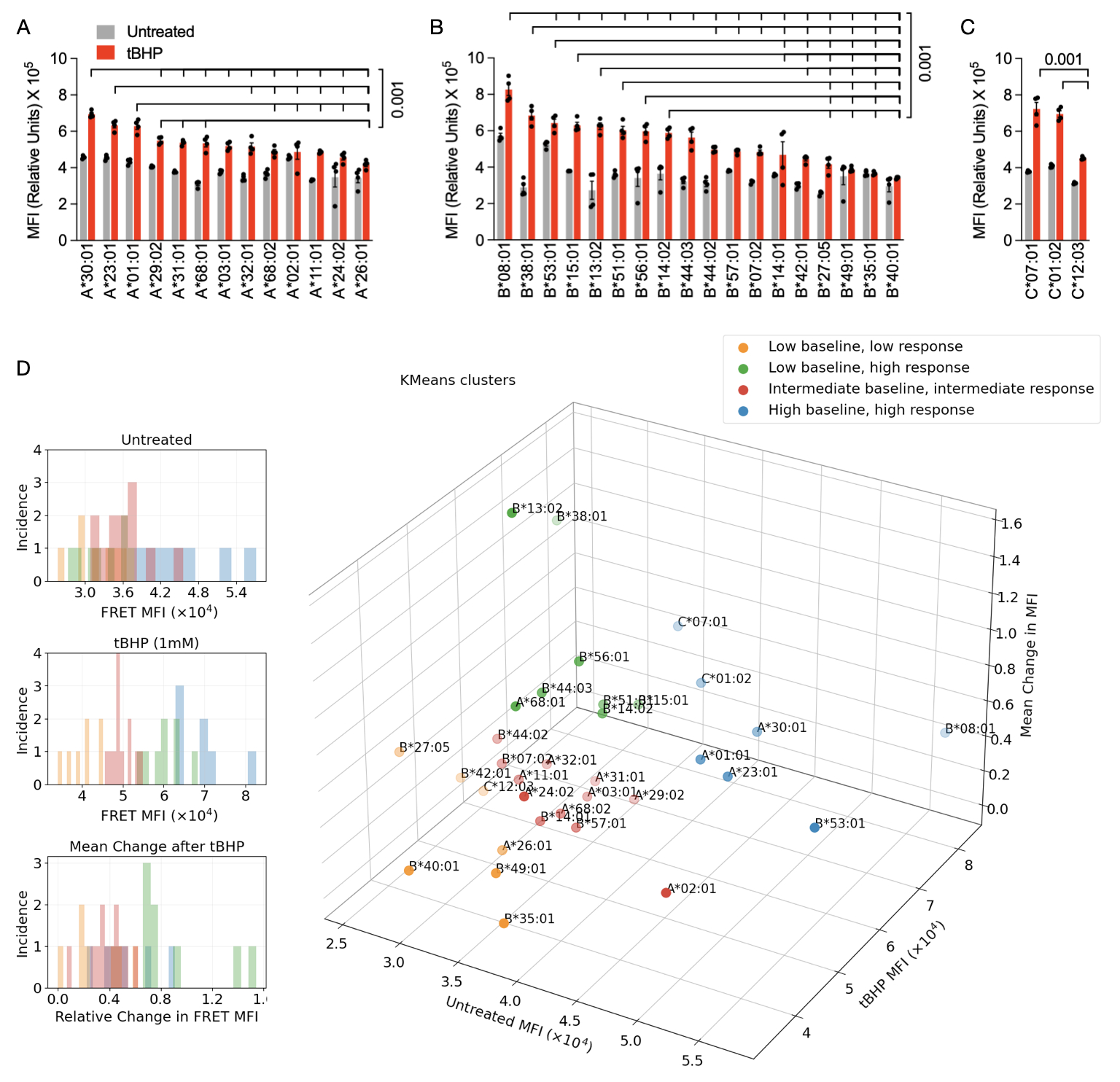Final ID: P-181
Class 1 human leukocyte antigens exhibit marked variability in capacity to present isolevuglandin adducts
Abstract Body: Introduction
Isolevuglandins (isoLGs) are lipid peroxidation products that covalently modify lysine residues on self-proteins. These modified self-proteins are processed to peptides that are presented in the context of class I major histocompatibility complexes (MHC-I). In hypertension, this modification enhances CD8+ T cell activation, contributing to inflammation and elevated blood pressure. In mice we found that IsoLG-adduct presentation is highly dependent on class I MHC structure. We sought to determine if human class I MHC (HLAs) exhibit similar variability in their ability to present these adducts by screening alleles representing 90% of the population.
Hypothesis
We hypothesize that HLA subtypes exhibit variable capacity for isoLG presentation.
Methods
HLA alleles representing 90% demographic frequency were identified from the US National Merit Donor Program Allele Frequency Database. HLA-null human K562 cells were transduced with these alleles, expanded, and enriched for HLA expression by flow cytometry to produce single HLA allele lines. To induce isoLG adduct presentation, cells were treated with 1mM tert-Butyl hydroperoxide (tBHP). After 24 hours, we employed Forster resonance energy transfer (FRET) between HLAs and isoLG-adducts using antibodies specific for both, which we have shown is indicative of IsoLG-adduct presentation (Fig 1A-C).
Results
Substantial variability for isoLG-adduct presentation was observed between HLA subtypes A, B and C (Figure 1A-1C). Scikit-learn’s KMeans clustering revealed four patterns of isoLG-adduct presentation among HLAs: Low baseline/low activation, low baseline/high activation, intermediate baseline/intermediate activation, and high baseline/high activation alleles (Fig 1D).
Conclusions
These findings identify specific HLA alleles as high isoLG presenters, potentially associated with increased immune activation risk. Combining these findings, HLA alleles, and diagnosis code databases could aid in identifying high-risk haplotypes for immune activation in human hypertension.
Isolevuglandins (isoLGs) are lipid peroxidation products that covalently modify lysine residues on self-proteins. These modified self-proteins are processed to peptides that are presented in the context of class I major histocompatibility complexes (MHC-I). In hypertension, this modification enhances CD8+ T cell activation, contributing to inflammation and elevated blood pressure. In mice we found that IsoLG-adduct presentation is highly dependent on class I MHC structure. We sought to determine if human class I MHC (HLAs) exhibit similar variability in their ability to present these adducts by screening alleles representing 90% of the population.
Hypothesis
We hypothesize that HLA subtypes exhibit variable capacity for isoLG presentation.
Methods
HLA alleles representing 90% demographic frequency were identified from the US National Merit Donor Program Allele Frequency Database. HLA-null human K562 cells were transduced with these alleles, expanded, and enriched for HLA expression by flow cytometry to produce single HLA allele lines. To induce isoLG adduct presentation, cells were treated with 1mM tert-Butyl hydroperoxide (tBHP). After 24 hours, we employed Forster resonance energy transfer (FRET) between HLAs and isoLG-adducts using antibodies specific for both, which we have shown is indicative of IsoLG-adduct presentation (Fig 1A-C).
Results
Substantial variability for isoLG-adduct presentation was observed between HLA subtypes A, B and C (Figure 1A-1C). Scikit-learn’s KMeans clustering revealed four patterns of isoLG-adduct presentation among HLAs: Low baseline/low activation, low baseline/high activation, intermediate baseline/intermediate activation, and high baseline/high activation alleles (Fig 1D).
Conclusions
These findings identify specific HLA alleles as high isoLG presenters, potentially associated with increased immune activation risk. Combining these findings, HLA alleles, and diagnosis code databases could aid in identifying high-risk haplotypes for immune activation in human hypertension.
More abstracts on this topic:
Angiotensin-converting enzyme (ACE): A new role to regulate β-oxidation in monocytic cells
Cao Duo-yao
Aortic Stenosis is Promoted by Ferroptosis via 5-LipoxygenaseQin Zihan, Haftbaradaran Esfahani Payam, Pawelzik Sven-christian, Bosman Matthias, Bergstrom Goran, Guns Pieter-jan, Franco-cereceda Anders, Back Magnus

